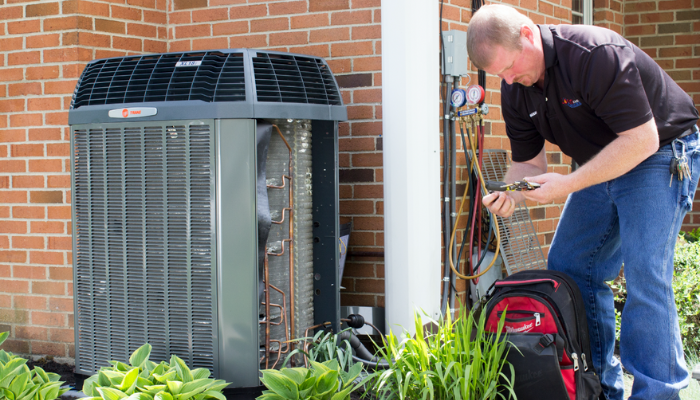Regular preventive maintenance is crucial for keeping your air conditioning system running efficiently and reliably during the hot summer months. By performing simple air conditioning preventive maintenance tasks, you can extend the life expectancy of your system, avoid costly repairs, improve energy efficiency, and ensure your home stays comfortable when temperatures rise. This guide will walk you through the benefits of preventative AC service, DIY maintenance checklists, and what signs indicate that it’s time to call in HVAC technicians for professional air conditioner service.
Why Preventative Maintenance Matters for AC Systems
The number one reason for conducting regular maintenance on an AC unit is to maximize its operational lifespan.
Air conditioners work hard during summer months, running for long hours every day, often in extreme heat. Like any machine, this puts wear and tear on components. Refrigerant leaks, loose wiring, clogged filters, corroded coils, and motor issues can crop up over years of use. Preventative maintenance helps spot minor problems before they lead to complete system failures. Checking for leaks, washing coils, changing filters, and visually inspecting the equipment goes a long way toward heading off repair needs. Another major benefit is more efficiency utility usage and warding off repair bills. Dirty condenser coils, clogged filters, and refrigerant leaks all reduce AC efficiency. Keeping your system well-maintained ensures it runs as energy efficiently as possible.
DIY Air Conditioner Maintenance Checklists
You don’t need to be an HVAC technician to perform basic preventative maintenance on your air conditioning unit. Here are handy checklists of tasks DIYers can easily complete themselves.
Spring AC Start-Up
- Check for debris blocking condenser unit airflow
- Spray off condenser coils with a hose if dirty
- Replace air filter
- Visually inspect for refrigerant leaks
- Check/clear drainage line for obstructions
- Inspect ducts for leaks
- Test AC operation and thermostat
Quarterly/Monthly Air Conditioning Maintenance
- Change air filters (every 1-3 months)
- Flush condensate drain lines with bleach or vinegar
- Check for odd noises or smells
- Ensure the thermostat temperature matches the room reading
- Clean debris from outdoor unit/fins
- Look for signs of leaks on lines/connections
- Verify that the HVAC system has power
Professional Preventative HVAC Service
While DIY maintenance covers the basics, HVAC experts have the skills and tools to safeguard system longevity. Professional maintenance work should occur at least once a year at the start of the cooling season. Reputable HVAC companies generally offer spring AC tune-up specials.
Technicians will use industry-grade tools to measure refrigerant levels, check system pressures, test electrical components, calibrate thermostats, inspect drain pans, ensure proper drainage, check duct integrity, clean coils, lubricate parts, and ensure optimal efficiency. They also have the expertise to troubleshoot issues and spot early signs of problems. Considering the expensive equipment investments involved, preventative HVAC maintenance is relatively inexpensive for the peace of mind it brings.
Emergency AC Repairs
While scheduled maintenance maximizes the intervals between emergency repairs, unexpected breakdowns can still occur. Common emergency issues include:
- Complete system failures on hot days
- Electrical problems like blown fuses, fan motor stops working, or sparking
- Refrigerant leaks lead to zero cooling capacity
- Water flooding due to clogged drain lines
- Frozen evaporator coils or ice buildup
In emergency scenarios, immediate technician diagnosis is needed to get the AC back up and running. Logan Services offers 24/7 emergency service visits when AC issues leave homes sweltering in the summer heat. Technicians can troubleshoot problems to restore cooling functions safely.
Ideal AC Preventative Maintenance Schedule
- Spring: Schedule a professional tune-up to inspect all AC components and ensure optimal summer performance.
- Monthly: Perform DIY tasks like changing filters, clearing exterior unit debris, and checking thermostat accuracy.
- Fall: Have an HVAC technician winterize your system with heating maintenance by inspecting airflow, sealing ducts, and assessing the furnace for any needed repairs.
- As Needed: Call a professional whenever issues arise, like reduced airflow, odd noises, or refrigerant leaks, to prevent small problems from becoming major breakdowns.
AC units work hard during summer’s peak operation period. That makes spring and fall the ideal times to book tune-ups so systems can enter seasons in tip-top shape. Monthly filter changes and clearing debris also keep systems humming smoothly. Reactive professional service may be needed at any point issues arise despite preventative steps. Don’t defer seasonal maintenance, though, as doing so risks having your AC fail on extremely hot days.
Signs Your Air Conditioner Needs Service
While preventative maintenance maximizes the intervals between major AC repairs, it can’t stave off problems forever. Units typically last 10-15+ years before replacement is needed. Be attentive to any of the following warning signs, which indicate it’s time to call an HVAC company:
- Increased Energy Bills: If your summer energy expenditures suddenly spike despite moderate weather, it likely signifies lowered AC efficiency. Refrigerant leaks, dirty coils, and other issues reduce efficiency.
- Reduced Airflow: If you notice rooms not cooling as quickly or cold air isn’t blowing as strongly, restricted airflow could be the issue. Clogged air filters are most common, but duct problems can also cause it.
- Unusual Noises: Odd noises like screeching, grinding, or squealing indicate a mechanical problem. Refrigerant leaks or failing components often create distinctive noises.
- Water Leaks: Dripping water from indoor AC vents is almost always due to drain line clogs. Outdoor unit leaks signal failing parts. Either way, consult HVAC technicians.
- Uneven Cooling: If cooling is patchy between rooms, there may be underlying duct issues requiring adjustment. Thermostat sensor malfunctions can also lead to uneven temperature regulation.
Many common AC problems quickly compound when left unaddressed. It’s wise to schedule service when any of the above indicators arise. Technicians can pinpoint underlying issues for repair.
Following a regular AC maintenance plan combined with professional service whenever problems arise allows homeowners to get the most value from cooling systems. Don’t defer seasonal maintenance – a small time investment in AC tune-ups saves money in the long term by keeping units running efficiently for over a decade in most cases. With proper care, your air conditioner will keep your home cool and comfortable throughout sweltering summers.
The Logan Difference
When you choose Logan A/C & Heat for your home’s heating and cooling needs, you get a partner committed to quality service from the initial consultation to the final walkthrough. As a family-owned company serving this community since 1969, the Logan difference centers on communication, expertise, and care for our customers.
Our tight-knit team isn’t just made up of technicians – it’s a family who understands what it means to serve area homeowners with urgency and purpose. We vet and train our installers extensively before allowing them into your home, ensuring they have the skills not only to repair and replace systems correctly but also to treat each customer with compassion and patience.
That training focuses on equipping our technicians with checklists for each unique job and testing their abilities to overcome obstacles that may arise. We pride ourselves on having an experienced install manager inspect and sign off on all work, giving our customers confidence in the end result.
At Logan A/C and Heat, your satisfaction drives us daily to deliver five-star services. That’s why homeowners in this area have trusted us for generations to keep their homes comfortable. We strive to build relationships with customers, not just complete a transaction. Partner with us for reliable maintenance services.
Frequently Asked Questions (FAQs)
How often should I change AC air filters?
Most manufacturers recommend replacing central air conditioning filters once every 60-90 days. Those with pets or allergy issues may need to change filters monthly. Disposable pleated filters trap dust and allergens better than fiberglass and are fairly inexpensive.
What temperature should I set the thermostat to?
Ideal thermostat settings for efficient cooling are around 72-78° F when occupying the home. You can adjust higher when away or lower by a few degrees for comfort when present. Lowering the thermostat drastically won’t cool homes faster. Turn it up to around 80°+ when gone for long periods to conserve energy.
Why does my AC freeze up sometimes? What should I do?
Periodic freezing of the AC’s evaporator coils, indicated by built-up frost or ice, is typically caused by low refrigerant levels. Running systems with freezing issues risks damaging the compressor. Turn your AC off immediately if you spot ice buildup until an HVAC technician can examine it. Refrigerant recharges will generally resolve freezing AC problems.
What are signs I may need to replace my AC system?
Once AC systems reach around 15 years old, replacement often makes better economic sense than continuing costly annual repairs. Warning signs include recurring failures, inability to keep the home cool on hot days, major rust on the exterior unit, very frequent refrigerant leakages, and skyrocketing energy bills. Getting quotes from HVAC companies is wise if your system is over 15 years old and shows any of these common end-of-life issues. Newer units offer vastly improved efficiency and reliability.





















